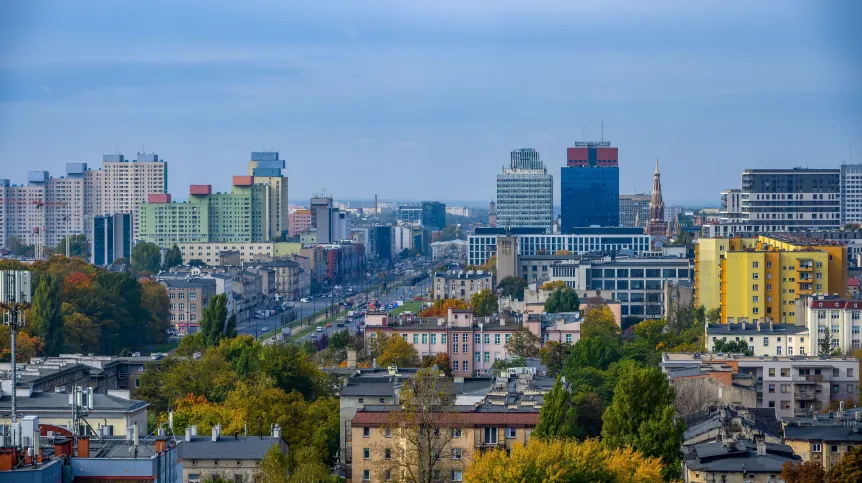
Scientists from the University of Lodz are developing solutions to prevent ecosystem degradation due to global warming. One of the projects is the international undertaking 'LifeCoolCity', which aims to strengthen the adaptive capacity of cities to climate change.
There are many causes of climate change, most of them are natural changes. However, the changes the effects of which we are currently observing, primarily global warming, are occurring very rapidly and even violently.
'This is because a factor has appeared that disrupts all natural processes. It is man and the development of civilization. Research conducted in the 19th century showed that when the carbon dioxide content in the atmosphere increases, the air heats up faster because it stops infrared radiation. And this is what is happening on our planet right now. If it were not for human influence, we would now be in a period of slight climate cooling, meanwhile we are seeing temperature increases at a rate that has never been recorded in the history of Earth', says Professor Iwona Wagner from the UNESCO Chair on Ecohydrology and Applied Ecology at the Faculty of Biology and Environmental Protection, University of Lodz.
She points out that over the last 40 years, each decade has been warmer than the previous one, and therefore the warmest in the history of meteorological measurements.
'For two or three years we have been recording inglorious monthly records practically without interruption - almost every month we hear that it was the warmest one in the history of measurements. Last year we exceeded 1.5 degrees Celsius, i.e. the temperature increase threshold, which - according to the provisions of the Paris Agreements - we were not supposed to exceed until the end of the 21st century. This is the temperature at which all ecosystem processes that are the basis of our existence on Earth became deregulated’, Professor Wagner says.
Additionally, the landscape has also undergone significant transformations as a result of human activity. According Wagner, man has transformed 75% of the Earth's surface, while losing one third of the forest area and 85% of wetlands compared to the pre-industrial period. And these ecosystems - as she points out - are crucial for maintaining good quality water resources on which societies, their development and economies are based.
'All this translates into the functioning of the superorganism that is Earth. Our selfish interest is to prevent further changes in the system which we are part of', she says.
Professor Wagner points out that to work on the climate crisis, we need mitigation: a strategy involving the reduction of anthropogenic emissions of carbon dioxide and other greenhouse gases, and adaptation - an action that allows socio-economic systems and the natural system to adapt to climate change.
Adaptation helps reduce losses and learn to function in the changing conditions and hydrometeorological risk.
'The idea is to find a path that will be flexible enough to allow us to function as socio-ecological and economic systems in the new reality. Adaptation is based on ecosystems and this is a topic that is being talked about a lot right now. At the moment, from the point of view of the European economy, it seems crucial to adopt the Nature Restoration Law, i.e. the regulation of the European Parliament and the Council on the restoration of natural resources', says Wagner.
She adds that the implementation of this regulation will strengthen the natural system, which is crucial for maintaining the good quality of water resources, on which societies, development and economies are based.
Numerous scientific studies are now being conducted in this area, several of which have been initiated by the University of Lodz. For example, the university established the ecohydrology concept that was used in the recultivation of the pond complex in Arturówek, one of the main recreational areas for the residents of Łódź. Thanks to innovative methods developed at the UNESCO Chair on Ecohydrology and Applied Ecology, and the subsequent implementation of the project, the water quality in the reservoirs and the Bzura River has improved.
'Since then, cyanobacteria have appeared only sporadically in Arturówek. Their mass blooms have not been recorded. The next project was on a larger scale. We implemented it in Radom and covered the entire city. Scientists from the University of Lodz participated in the work of the team that was the first in Poland to develop a comprehensive analysis of the city's susceptibility to climate change. We used the experience gained in Arturówek and the ecohydrological solutions patented there to improve water quality. Nearly 20 demonstration areas were created on rivers, the Borki reservoir and in several places in the city', Wagner says.
The experience gained by scientists is being used in the current large project 'LifeCoolCity. Use of remote sensing for management of blue-green infrastructure in the process of city adaptation to climate change'. The objective of joint activities of various institutions is to strengthen the adaptive capacity of European cities to the effects of anthropogenic climate change, and thus bring them closer to the model of smart cities of the future.
'As a partner in the project, the University of Lodz takes part in the assessment of the adaptation potential of cities based on blue-green infrastructure. The project has the ambition to support the management of European cities in this area and we want to strengthen their adaptation capabilities to climate change and thus expedite implementation of the EU adaptation policy’, says Professor Wagner.
As a result, city managers and residents will have four information products at their disposal. The first is an index for 10,000 European cities, which, based on satellite images, will allow scientists to assess which cities are better and worse adapted to increasing climate change. Work on this part of the project will be completed next year, and the monitored cities will be able to use the research results for free.
Secondly, satellite data will be used for a more detailed assessment of selected 50 cities in Europe. 'We will examine in detail the degree of ground sealing, city overheating, problems with flooding and drying out, as well as biodiversity and the condition of vegetation. The idea is to identify the areas where work should be done, for example on the structure of greenery or the direction of water flow, in order to support the city's adaptation', Wagner continues.
The next tool will be based on aerial data. 'These are very detailed photos that will show the condition of a specific city. This city will be Wrocław, which is a partner in the project. In this case, city districts, quarters and even individual plots can be scanned in order to solve environmental problems', she says.
Based on this study, it will be possible to identify specific nature-based measures that will improve the city's adaptive potential.
The fourth product to be created as part of the project will be used to monitor the implemented adaptation activities, so that every few years it can be checked whether they are working properly.
The 'LifeCoolCity' project is co-financed by the European Union and the National Fund for Environmental Protection and Water Management. (PAP)
PAP - Science in Poland, Bartłomiej Pawlak
bap/ zan/ js/ kap/
tr. RL













